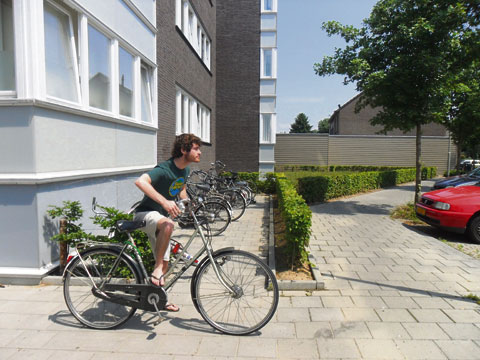Name: Devin Malone (MSc Industrial Ecology)
Brand: Batavius
Price: €38
Striking feature: Electrical tape holds it together
“Bikes are one of my favorite things about the Netherlands.
Name: Devin Malone (MSc Industrial Ecology)
Brand: Batavius
Price: €38
Striking feature: Electrical tape holds it together
“Bikes are one of my favorite things about the Netherlands.
I’m from Alaska, which is a place where biking is a summer-only, recreational activity for most people. I lived in Portland, Oregon, before I came here, and Portland is a premier biking city in the US, but it’s nothing like the Netherlands. I’m pretty sure there isn’t a single place in the whole United States that has as many bikes as the Delft train station – not even a bike factory! And in Portland, because some people bike and some people drive, there’s a lot of tension between the two groups. Here, virtually everyone bikes at least sometimes, and so drivers are much more courteous.
My Master’s programme is in Leiden and Delft, so I have a bike in each town – plus another one in Sittard, where I intern at DSM. I usually find them on marktplaats.nl, because it’s a lot cheaper than going to a bike shop, and it’s an easy way to practice your Dutch – although you have to look around some to find something good. All of my Dutch bikes are strictly utilitarian, and geared towards a student budget. My bike is for getting to school, to the train, to the party, and to buy groceries. In the US I owned a really nice Lemonde racing bike, and would do long tours on the weekends, but here I just get around. That was one thing I noticed when I got here: bikes are very utilitarian, whereas in the US they’re more geared towards either road or off-road performance – even if you don’t really need it. There are also many more types of locks and lights available here than in the US; there’s something to suit different needs of portability, security, utility.
The first bike I bought here was a 21-speed, and I liked to go fast, but the bike I use now is a more typical Dutch one, where you sit upright, and there are only two speeds. It took some getting used to, but now I really like ambling around at the same speed all the time. It’s a different type of cycling, and much more relaxing. Of course, it only works because the Netherlands is so flat – the biggest hills you’ll find are the bridges!”
Afgelopen maand verliet het schip de werf in Groningen en werd het ‘Ecolution’ gedoopt door de burgemeester Rehwinkel vanuit een wankel skiffje in de Zuiderhaven.
De Ecolution is een klassiek gelijnd schip met opmerkelijke innovaties onder de waterlijn. Het schip zal slechts in noodgevallen van de dieselmotor gebruik maken (en dan nog op biodiesel), want het zal tijdens de vaart elektriciteit opwekken die opgeslagen wordt in accu’s aan boord.
Tijdens het zeilen (verwachte kruissnelheid 10 knopen, of 18 kilometer per uur) drijft het passerende water onder het schip twee propellers aan. Dat zou twee maal 10 kilowatt aan elektrisch vermogen op moeten leveren. Drie tot vijf zeildagen zouden genoeg elektriciteit moeten opwekken om een maand comfortabel aan boord van te kunnen leven.
De haven in- en uitvaren gaat geruisloos, want elektrisch. Daarvoor is het schip uitgerust met twee 30 kilowatt elektromotoren.
Na Sail komt de Ecolution in Scheveningen te liggen waar het schip gedurende een jaar proefvaarten zal ondergaan. Daarna wil Ockels er met zijn vrouw Joos mee op wereldreis.
Lees meer bij de wereldomroep.
Of op de projectsite van Ecolutions

Comments are closed.